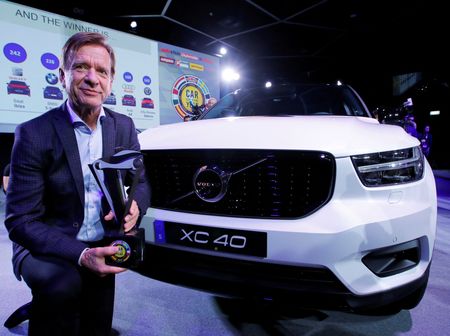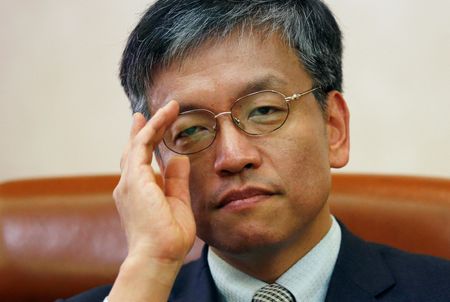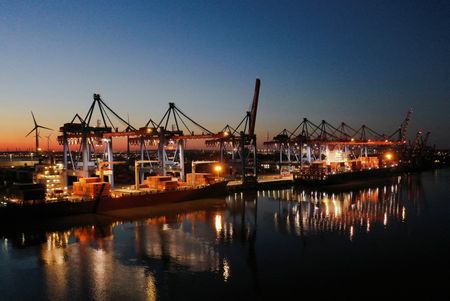By Marie Mannes and Nick Carey
STOCKHOLM/LONDON (Reuters) -Volvo Car’s abrupt decision to tap Hakan Samuelsson as its CEO puts the car industry veteran back in charge of steering the automaker through U.S. President Donald Trump’s tariff turbulence and a wobbly transition to electric cars, analysts and investors said.
Samuelsson, who led the Swedish automaker for a decade from 2012 to 2022, helped to revitalise the Volvo brand and oversaw the company’s initial public offering in 2021 on the Stockholm Stock Exchange.
He was also running Volvo during Trump’s first term, during which the company built a car assembly plant in South Carolina, a move that could prove crucial if Trump goes ahead and slaps 25% tariffs on U.S. car imports on Wednesday.
His car industry background contrasts with outgoing CEO Jim Rowan, who joined in 2022 from Dyson without any car industry experience.
Rowan was an unconventional choice with a three-decade career in the consumer and technology sectors. But at the time, the automaker said Rowan’s experience of digitalisation, disruption, innovation, engineering and supply chains would be valuable.
Volvo Cars board Chair Eric Li, also known as Li Shufu, said Samuelsson’s experience was exactly what was needed as the car industry was entering a more complex phase.
“We know Håkan Samuelsson as a very knowledgeable and experienced leader in the industry,” Carina Silberg, head of Governance and ESG at Alecta, the fifth largest shareholder in Volvo Cars, said.
Sverre Linton, chief legal officer of the Swedish Shareholder’s Association, which represents small shareholders in Volvo, said: “But … Samuelsson is not a wizard, he also needs the help of a solid strategy in which the board plays a central role creating.”
Other investors and analysts said in research notes and interviews with Reuters that they were surprised by the news, but echoed the view that it was Volvo going back to its roots.
Samuelsson, 74, has been appointed for a two-year stint while the company searches for a long-term replacement.
Volvo’s shares, which are down almost 70% since the group’s 2021 listing, fell slightly on Monday, hitting a new all-time low although the move was in line with the wider market in Stockholm, which was down nearly 2%.
“For me it was kind of unexpected, the share price has clearly underperformed the automotive industry, but on the other side operationally, the company has done better,” said Handelsbanken analyst Hampus Engellau.
The return of Samuelsson to the helm of Volvo also comes at a challenging time for the Swedish automaker’s owner, China’s Geely, which owns 78.7% of Volvo’s stock.
Geely has been restructuring its sprawling holdings, which included replacing the CEO of troubled EV maker Polestar in August, again opting for an industry veteran .
Shufu has come under pressure from investors and is due to attend Volvo’s annual shareholders’ meeting for the first time later this week. Shareholder advisory groups ISS and Glass Lewis have both advised against reelecting him as chair over his failure to attend the vast majority of the Swedish automaker’s board meetings over the last fiscal year.
BUYING TIME
Rowan’s appointment in 2022 coincided with sweeping changes in the car industry.
EU tariffs on Chinese-made electric vehicles forced Volvo to move production of its SUV EX30 to Belgium from China and Trump’s re-election has produced more tariff headaches.
Rowan recently talked of shifting more production to its U.S. plant if Trump goes ahead with duties.
Volvo is one of the most exposed automakers to Trump’s tariffs because even though it produces its SUV EX90 in its Charleston, South Carolina plant, it also imports most of its hybrid and electric models from Europe at the moment.
In September, the slower-than-expected uptake of EVs also forced the Swedish automaker to abandon its target for going all-electric by 2030.
Last month, Rowan warned the company might struggle to match its 2024 sales performance and profitability.
Even though Volvo has impressed analysts with sales growth from previous years, delays to key electric models, a price war on electric cars and weak EV demand have put pressure on its shares, which have underperformed the European car market.
Against that backdrop, Handelsbanken analyst Engellau said Samuelsson was a safe bet.
“This is a very good temporary solution because Hakan (Samuelsson) was CEO for 10 years,” he said. “He knows the company well, he knows many of the people.”
“So now they are buying time to find a new CEO,” Engellau added.
(Reporting By Marie Mannes in Stockholm and Nick Carey in London;Editing by Josephine Mason and Jane Merriman)









